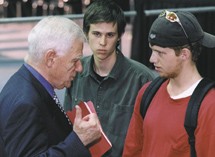All-campus forum sheds light on terrorism

At Lewis & Clark College on Friday, [Sept. 21,] Michael Mooney shut down the campus to teach,” reported The Oregonian.
Indeed, President Mooney closed offices and canceled regular classes to enable all members of the Lewis & Clark community to gather in Pamplin Sports Center for an academic forum designed to shed light on the origins and consequences of terrorism.
“The events of Sept. 11 have evoked in our community, as throughout the world, a tangle of emotions, some more obvious than others,” Mooney said. “While we cannot leave these emotions at the doorway to Pamplin, we can subject them to reasoned discourse and hope, thereby, to make of ourselves a better-informed citizenry.”
Conceived as “an academic, not a political, event, a call to understanding, not action,” the forum engaged the expertise of 11 faculty members, organized into four panels.
Understanding the Middle East
Paul Powers, visiting assistant professor of religious studies, outlined the history and beliefs of Islam, noting that suicide is widely condemned in Islam as interference with God’s will. He also discussed the attributes of Islamic fundamentalism. Zaher Wahab, professor of education, described the history of violence in his birthplace, Afghanistan. And Cyrus Partovi, senior lecturer in the social sciences, addressed U.S. interests and commitments in the Middle East, tracing problems in the area to the Truman Doctrine of 1947.
Responding to Violence and Terror
Jerusha Detweiler-Bedell, assistant professor of psychology, described biological responses to coping with terror. Andrew Bernstein, assistant professor of history, analyzed how the attacks on the World Trade Center and the Pentagon were similar and dissimilar to the attack on Pearl Harbor. And Roger Paget, institutional professor of political economy and Asian studies, argued for a “new civility.”
Defending Our National Security
Mark O. Hatfield, U.G. Dubach Professor of Political Science, added poverty, illiteracy, racism and poor health to the list of national security threats. Bob Mandel, professor of international affairs, analyzed the pros and cons of strategies to combat terrorism and compared the terrorist attacks on the United States to the attacks of the Visigoths on the Roman Empire. He encouraged Americans to raise questions of their government but to do so in ways that demonstrate knowledge, respect and civil discourse rather than mindless name-calling.
Combating Terrorism Legally
Susan Mandiberg, professor of law, summarized federal laws relating to terrorism. Bill Funk, professor of law, discussed relevant constitutional and statutory laws. And John Grant, visiting professor of law at Lewis & Clark and a member of the Lockerbie Trial Briefing Unit at Glasgow University, analyzed international laws relating to terrorism.
“Just as we can’t end murder and violence, we can’t end terrorism,” Grant said. “But that doesn’t mean we shouldn’t try.”
Following each session, faculty and students had a chance to ask questions: “What is terrorism?” asked Fauna Doyle, a senior majoring in communication. “How will we know when the war on terrorism is over? When will we decide we can take back the civil liberties we give up?”
“What forms will terrorism take?” asked Mark Dahl, library technology coordinator.
“If bin Laden were caught, could he get a fair trial?” asked Alex Graham, a junior.
“We learned from our remarkable faculty that it is difficult to define terrorism and even more difficult to make it go away,” Mooney said at the end of the seven-hour forum. “In reality, terrorism will be with us for a long time. It will survive me.
“It will fall to you who are students to deal with terrorism decisively. You will be the politicians, the lawyers and the journalists,” he commented.
“Like it or not, we are left with the metaphor of war. If this is the case, let it be said, as Winston Churchill said of the Second World War, that it was ‘a great war, a good war, not a war for domination.’”
More L&C Magazine Stories
Lewis & Clark Magazine is located in McAfee on the Undergraduate Campus.
MSC: 19
email magazine@lclark.edu
voice 503-768-7970
fax 503-768-7969
The L&C Magazine staff welcomes letters and emails from readers about topics covered in the magazine. Correspondence must include your name and location and may be edited.
Lewis & Clark Magazine
Lewis & Clark
615 S. Palatine Hill Road MSC 19
Portland OR 97219

